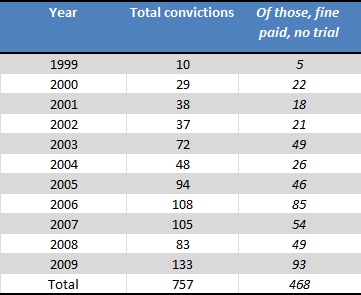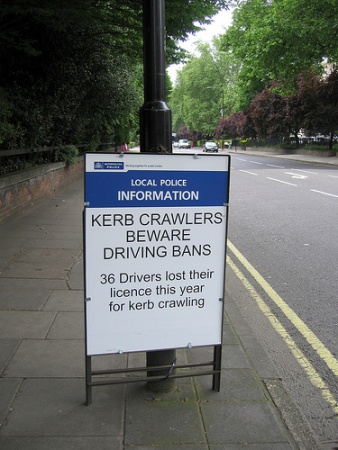 What do sex offenders and clients of sex workers have in common? To understand why my answer is a great deal, you need to look at how outsider sexualities are constructed so that some sex is deemed to be Good, everything else to be Bad and transgressors become monsters.
What do sex offenders and clients of sex workers have in common? To understand why my answer is a great deal, you need to look at how outsider sexualities are constructed so that some sex is deemed to be Good, everything else to be Bad and transgressors become monsters.
I read Roger Lancaster’s 1994 book Life is Hard: Machismo, Danger, and the Intimacy of Power in Nicaragua ten years ago when I was looking for ethnographic accounts of non-mainstream sexualities and gender identities. Lancaster has a new book, Sex Panic and the Punitive State, which I have not read, but I was struck by his ideas in the following essay about sex offenders. Men who buy sex occupy an increasingly similar social position nowadays: considered either monsters or perverts. This year’s TIP report and the End Demand campaign insist that these men’s desires and bodies are simply wrong. Clients are not yet placed on Sex Offender Registers, but schemes to name and shame them in the media approach that idea and I will not be surprised if calling them sex offenders is proposed.
Note in an example from the other day’s Vancouver Sun: Make human traffickers’ names public: law professor. Perrin opposes Judge Susan Himel’s decision last year to remove from Ontario Law significant barriers to safe sex work (he was on Melissa Farley’s side). Perrin is a law academic who loves the police.
And don’t imagine that men called sex offenders are really bad in a way that men who buy sex are not: it’s the process of demonisation you want to keep your eye on, and how society handles those demonised.
The essay is long, so I have cut it. About halfway through I highlight with bold techniques being used and suggestions being made for further stigmatisation of a wide range of people.
Sex Offenders: The Last Pariahs
Roger N. Lancaster, New York Times, 21 August 2011
. . . most criminal justice advocates have been reluctant to talk about sex offender laws, much less reform them. The reluctance has deep roots. Sex crimes are seen as uniquely horrific. During the Colonial, antebellum and Jim Crow eras, white Americans were preoccupied with tales of sexual dangers to white women and children McCarthy-era paranoia, stories of Satanic ritual abuse and other sex panics stirred pervasive anxieties about lurking strangers. Sexual predators play a lead role in the production of a modern culture of fear.
. . . The most intense dread, fueled by shows like “America’s Most Wanted” and “To Catch a Predator,” is directed at the lurking stranger, the anonymous repeat offender. But most perpetrators of sexual abuse are family members, close relatives, or friends or acquaintances of the victim’s family. . .
. . .Advocates for laws to register, publicize and monitor sex offenders after their release from custody typically assert that those convicted of sex crimes pose a high risk of sex crime recidivism. But studies by the Justice Department and other organizations show that recidivism rates are significantly lower for convicted sex offenders than for burglars, robbers, thieves, drug offenders and other convicts. Only a tiny proportion of sex crimes are committed by repeat offenders, which suggests that current laws are misdirected and ineffective. . .
Contrary to the common belief that burgeoning registries provide lists of child molesters, the victim need not have been a child and the perpetrator need not have been an adult. Child abusers may be minors themselves. Statutory rapists – a loose category that includes some offenses involving neither coercion nor violence – are covered in some states. Some states require exhibitionists and “peeping Toms” to register; Louisiana compelled some prostitutes to do so. Two-thirds of the North Carolina registrants sampled in a 2007 study by Human Rights Watch had been convicted of the nonviolent crime of “indecent liberties with a minor,” which does not necessarily involve physical contact.
. . . Newer laws go even further. At last count, 44 states have passed or are considering laws that would require some sex offenders to be monitored for life with electronic bracelets and global positioning devices. A 2006 federal law, the Adam Walsh Act, named for a Florida boy who was abducted and killed, allows prosecutors to apply tougher registration rules retroactively. New civil commitment procedures allow for the indefinite detention of sex offenders after the completion of their sentences. Such procedures suggest a catch-22: the accused is deemed mentally fit for trial and sentencing, but mentally unfit for release. Laws in more than 20 states and hundreds of municipalities restrict where a sex offender can live, work or walk. California’s Proposition 83 prohibits all registered sex offenders (felony and misdemeanor alike) from living within 2,000 feet of a school or park, effectively evicting them from the state’s cities and scattering them to isolated rural areas.
Digital scarlet letters, electronic tethering and practices of banishment have relegated a growing number of people to the logic of “social death,” a term introduced by the sociologist Orlando Patterson, in the context of slavery, to describe permanent dishonor and exclusion from the wider moral community. The creation of a pariah class of unemployable, uprooted criminal outcasts has drawn attention from human rights activists . . . Several states currently publish online listings of methamphetamine offenders, and other states are considering public registries for assorted crimes. Mimicking Megan’s Law, Florida maintains a website that gives the personal details (including photo, name, age, address, offenses and periods of incarceration) of all prisoners released from custody. Some other states post similar public listings of paroled or recently released ex-convicts. It goes without saying that such procedures cut against rehabilitation and reintegration.
Our sex offender laws are expansive, costly and ineffective – guided by panic, not reason. It is time to change the conversation: to promote child welfare based on sound data rather than statistically anomalous horror stories, and in some cases to revisit outdated laws that do little to protect children. Little will have been gained if we trade a bloated prison system for sprawling forms of electronic surveillance that offload the costs of imprisonment onto offenders, their families and their communities.
This is the context in which End Demand campaigns are occurring. Writing on the wall.
On the panic point, I will be talking on a panel about sex scandals at the AAA in Montreal next month. Offenders, clients, scandals, panics: all related in ways I am trying to figure out.
–Laura Agustín, the Naked Anthropologist





 The
The 





















